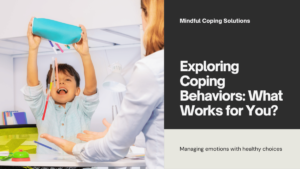Coping behaviors are processes and practices that people use to manage stressors. Some of the coping mechanisms are adaptive and healthy. In contrast, others tend to be maladaptive and unhealthy in the extreme, depending on the reliance placed on them. This is because negative coping behaviors may offer a specific sort of comfort for some time but are actually damaging for the longer term. Examples include the use of substances, loneliness, being abusive to people, and the performance of acts that harm the individual.
The good news is that Counseling can assist in discovering unhealthy modes of behavior and proper methods. Self-reflection with the help of a licensed therapist or counselor can be a productive way to attain beneficial views and motivation and healthy ways to gradually avoid negative behaviors for an extended period.
Positive and Negative Coping Behavior: Understanding the Purpose
The first form of knowledge is to better understand why people resort to self-destructive coping strategies in the first place. Maladaptive coping mechanisms are adopted as a means by which one can deal with uncomfortable feelings and stressful situations that seem uncontrollable.

They can provide:
– Such as temporary freedom or deliverance from a difficulty.
– Feeling of control
– The ability to expel physical or mental energy.
Even though the behaviors may serve as helpful or cheerful in some way, they are likely to produce more negative consequences later on. One has to understand that a counselor may assist in getting to the core of behavior – and the reasons behind it, including why a person behaves in such a way and what needs are unmet and served by such actions.
Self-awareness and emotional intelligence are two critical skills that are essential for the functioning of an individual in society.
Counseling encompasses self-identification and personal strengths as well as interpersonal skills that involve emotional skills.
These include:
- Emotion regulation –The ability to recognize emotions and situations that make it necessary to use unhealthy coping mechanisms essential. This helps one realize they are headed into the wrong part before they fall into counterproductive behaviors. People have to learn how to listen to their inner selves and learn personal stimuli.
- Changing negative schemas –At times, it is the negative schemas that harm others and act on such cognition. During counseling, one can be made to discover some distorted thoughts that affect one’s feelings and acting. Cognitive restructuring plays a significant role in changing behaviors because thoughts are powerful tools.
- Accountability –A part of change is being ‘responsible for one’s behavior, choices, or for healing. This form of therapy ensures that individuals can embrace their accountability by providing them with reachable goals, checking up on them, and acknowledging the milestones that they make.
Learning Healthy Coping Strategies
After concerned factors are resolved, counselors move to foster more constructive patterns of managing stress in the long term.
Each person’s needs differ, but common positive strategies include
- Physical activity –Activities that involve a certain degree of vigor, like aerobics, cycling, jogging, swimming, walking, or any form of exercise the patient enjoys, can release tension and stress. This enables thinking to be done before acting, making it easier to come up with a logical conclusion on what to do next.
- Handling tactics– Counseling presents strategies on how to handle developing emotions when they are not healthy. This may involve writing on a piece of paper, coloring, exercising, or talking to a friend or a life coach.
- Interpersonal skills– Instead of reacting to difficulties, Counseling presents a structured method of identifying challenges, coming up with solutions, weighing the advantages and disadvantages of solutions, and developing strategies.
- Building social support –Isolation maintains negative coping patterns. Counselors assist clients in repairing or building relationships for affection in their situations.

Unconditional positive regard is a concept about the overall purpose of counseling.
The concept that has to be considered for therapy to assist individuals in being effective in helping them to progress is the need for an individual to feel comfortable and take chances under the watchful eye of the counselor. Unconditional Positive Regard (UPR) means that one has to accept a client no matter the actions or feelings they may have towards the helper.
It is trusted when UPR is offered, thus encouraging an excellent counselor-client relationship. It provides permissiveness to speak out on issues of concern without being suppressed or rejected. Gradually, it assists in incorporating the positive images of self and others into the psyche. It is from the security, and the loving environment developed that altering the coping strategies for the worst can be viewed.
Conclusion
It is not easy to overcome negative Self-images and other toxic behaviors, and the process requires bravery, persistence, and patience. However, the possibility of growth can be considered achievable, and that is why people who want to have it should be ready to turn to professionals. Counseling supplies interpersonal interaction, individual understanding and support, skills, and motivation in modifying negative patterns of behavior. Through the process of therapeutic work, the opportunities of living a healthy, fulfilling life only grow gradually with the proper effort.
